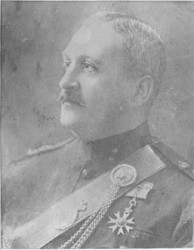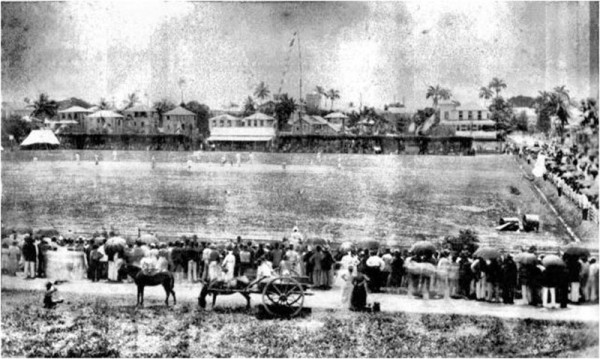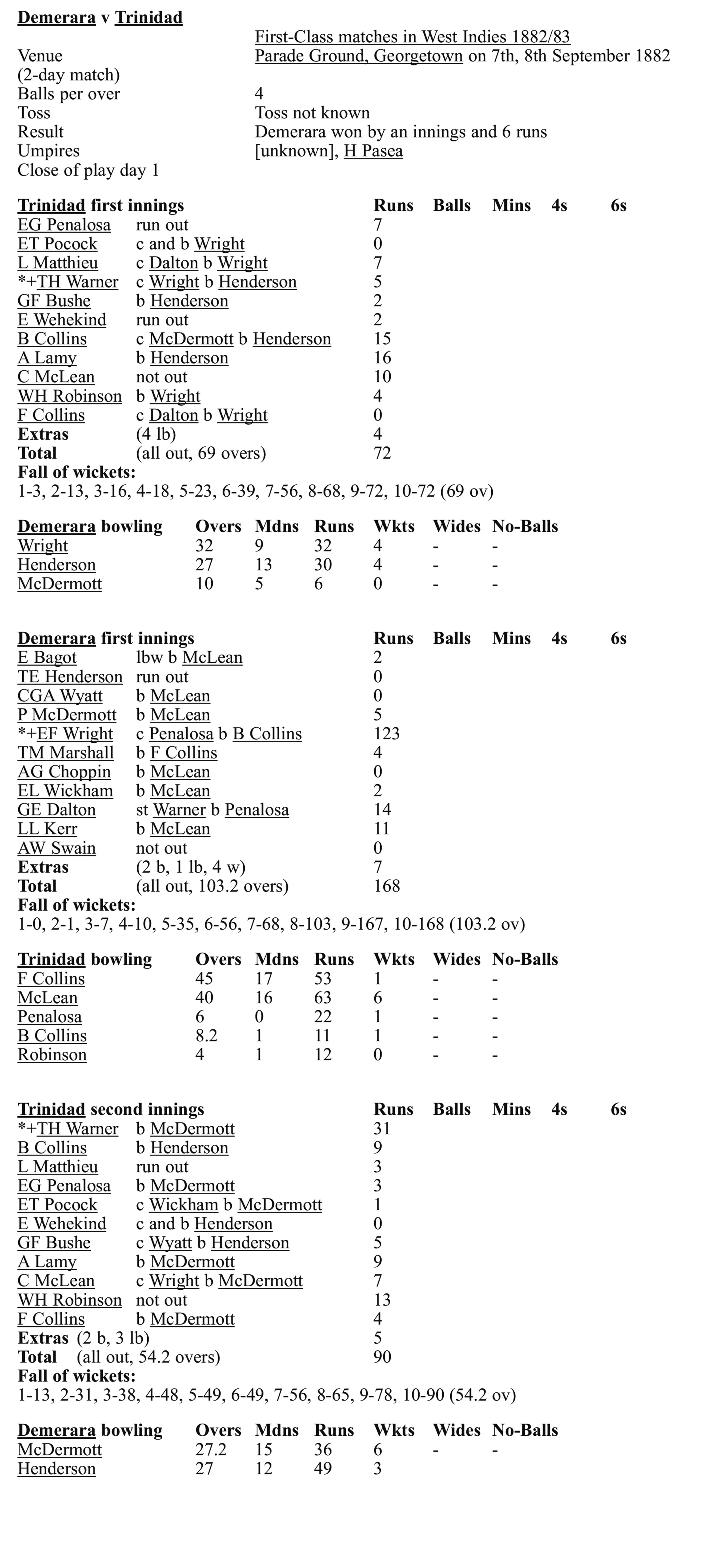66 Waterloo Street,
Georgetown,Demerara.
10th September, 1882
Dear Father and Mother,
I trust that this letter will find you both in the best of health and in good spirits.
Our boat arrived at Stabroek Stelling on the morning of Monday, 4th September at ten o’clock sharp after stops in Antigua, St Vincent, Barbados and Tobago.
The voyage was quite uneventful, save for an older gentleman from London taking ill and having to be taken to the hospital in St Vincent, from where I managed to post a letter home and secure a bottle of their finest rum.
We actually arrived two days ahead of schedule, compliments of the excellent weather conditions in the Atlantic Ocean, and just in time for the grand occasion of the month, a first class cricket match between Trinidad (a neighbouring island colony) and Demerara.

Father, do you remember taking me a few years ago, in 1878, I think, to look at that Australian XI play against Gloucestershire at Clifton College Close ground? The Australian side included FR Spofforth, WL Murdoch, the Bannerman opening pair and DW Gregory. The Honourable Doctor, WG Grace led Gloucestershire. One of the members of Doc’s team, an EF Wright is now working here and is a member of the Georgetown Cricket Club. The club allows only members of British birth or descent, and apparently it organizes and controls the local cricket.
The match was quite an affair. It began on the 7th and was completed on the 8th, and it seemed as though the Who’s who of the Town was in attendance. The Governor, most of the Colonial office staff, the plantation owners, and of course, their wives, with their parasols and their attendants. Needless to say, everyone was impeccably attired. I have to note, on first impressions, they are certainly living the good life down here in the colonies.
The contest was on the Parade Ground (Uncle Herbert’s house is on the eastern boundary). I must mention that the entire place seems to be neatly laid out in squares, apparently an inheritance of past sugar plantations.
It began with fanfare of pomp and ceremony. Trumpet blowing along with the teams being introduced to the Governor in blazing sunshine. Mother, you would enjoy this wonderful weather, I am going through two handkerchiefs daily. By a stroke of luck, I found myself seated next to one Mr James Rodway of the local Royal Agriculture and Commercial Society. A botanist by profession, he has been here since 1870 and understands the lay of the land and the Society quite well.
We discovered an immediate kinship, and amidst the game and a few swigs of a smooth local rum (he knows the owner of the estate, I suspect he knows everyone), from a flask in his satchel, he proceeded to present a brief, (albeit over two days) history of the immediate environs and the local politics.

Trinidad batted first on a pitch probably more suitable for the grazing of sheep. Most of the field is very hard, the grass is almost two inches thick, with quite a few tufts and a large number of holes. The scoring of runs was going to present quite a challenge under such conditions.
EF, the captain and TE Henderson opening the bowling! EF bowls round arm right hand medium fast.
The overs are only four balls and are completed very quickly. Trinidad were soon in trouble with five wickets down with only 23 runs on the board. However, the lower order dug their heels in and they posted 72 from 69 overs. E.F. got 4 wickets for 32 runs and also did some wicket keeping. The large crowd in attendance cheered lustily in support of Demerara.
In reply, the home side found the pitch just as difficult for run scoring and at the close of play were 50 for 5, I think, (my memory is a little hazy here), but our captain, EF, was still at the wicket, playing with a very straight bat.
When the match resumed on the 8th, Demerara lost two quick wickets and were 68 for 7. Doctor WG Grace would have been very proud to witness the next two hours. No longer content to gather singles and doubles, EF resorted to trumping the ball as hard as he could. Standing almost six foot tall and weighing close to twelve stone, he swung wildly and often, much to the chagrin of the Trinidadians as he connected for a plethora of boundaries, mostly fours with some sixes. With Dalton, he took the score to 103 and then added a record 64 for the ninth wicket, with LL Kerr.
When he was finally out, caught on the boundary, for a great knock of 123 on his first class debut in the colonies out of a total score of 168, he was given a standing ovation by all in attendance, including the Trinidadian side.
Between innings, Mr Rodway informed me that it was the first first-class hundred in the Caribee colonies. He took the opportunity to give a quick history lesson. The street on the western side, Carmichael, was named after the Governor who was instrumental in purchasing the Parade Ground from the estate of Thomas Cuming. The Promenade Gardens to the north had a wide selection of the local fauna, and Carmichael Street was the location of Government House opposite the gardens, and Queen’s College Grammar School was also located on Carmichael Street, on the corner with Murray Street. And the Parade Ground, had been the scene for a series of executions following an insurrection on the East Coast in 1823.
Trinidad fared slightly better the second time around, managing to accumulate 90 runs, as P McDermott took six wickets. Demerara won by innings and six runs.
It was a wonderful introduction to the colony. Mr Rodway and I cheered the victory with another estate brand of rum, as the crowd mingled in the post-match celebrations.
I am scheduled to begin working on one of the out-of-town estates on the 15th September. I will know which one later this week.
Yes, mother, I did attend church this morning at Christ Church, down the street from Uncle Hubert.
Best wishes and stay well.
Your son
Arthur
Trivia question: Can you name the all-time Guyana XI selected by the panel?
EF Wright’s Career
EF Wright played 18 first class matches between, 1878 and 1902, representing Gloucestershire, Demerara, British Guiana and Jamaica. In 1886, EF led a West Indies Team on a tour of Canada and the USA. Their record was 12 wins with 2 losses.
In the first Inter-Colonial tournament held in 1895, at Bourda, EF scored 96 versus Trinidad; in the final versus Barbados, he had scores of 26 and 85, and bowling returns of 3 for 58, and 7 for 55, as British Guiana won by 175 runs.
In 1887, playing for Demerara versus Barbados at Bourda, he had the remarkable bowling figures of 23 overs 16 maidens and 15 runs for 7 wickets.
In 1898, he was posted to Jamaica where he joined the Jamaica Constabulary and was promoted to the rank of Inspector General. In 1902, he was selected in three matches again RA Bennett’s XI.
Edward Fortescue Wright was murdered in 1904 in Montego Bay, while investigating a riot.
The first West Indian Skipper was 46 years old.
Where he joined the Jamaica Constabulary and was promoted to the rank of Inspector General.



